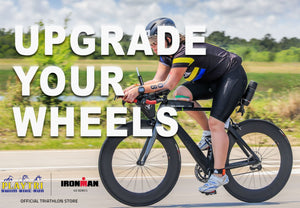
WHAT IS SWEAT RATE TEST
Because endurance athletes tend to do most of their training outdoors, it is incredibly beneficial for your safety and performance to understand how much sodium you lose in your sweat and what your sweat rate is.
The best and simplest way to learn how much sodium you lose while sweating is to do an Advanced Sweat Test at Playtri. As sweaty as this test may sound, it is the easiest performance test for the athlete that we administer. The test takes approximately 45 minutes and you spend all that time sitting in a chair while the tester does all the work. The test results will show you the amount of sodium you lose in 32 oz of sweat and give you a personalized hydration plan with specific water and sodium intake recommendations. We highly recommend this test for all athletes pursuing health or performance, but especially for those pursuing long course or competitive short course goals. Knowing how much sodium you lose in 32 oz of sweat and knowing your sweat rate is very helpful in determining your hydration plan.
Determining your sweat rate, however, is a bit more involved and a bit more sweaty. While your sodium loss remains constant, your sweat rate will vary depending upon intensity, temperature, humidity, clothing choices, heat acclimation, etc.
Because of this variability, sweat rate testing should be done for all your key workouts and in various conditions throughout the year if you want the results to help you as much as possible on race day. And sweat rate testing is something that we ask all our gold and silver level individual coached athletes to do for their key workouts throughout the year. Here’s how we do sweat rate testing with our athletes.
Before your key workout: track your pre-workout nutrition and hydration and weigh yourself naked after one final trip to the bathroom. Also note the temperature and humidity at the beginning and end of your workout, which will help with your coach’s nutrition & hydration planning for your next race.
During your workout keep track of the amount of water and sodium you consume per hour. And the amount of carb calories your consume per hour. After your workout, towel yourself dry and then weigh yourself naked again.
Once I have all this information from my athlete, I then use the following formula to determine their hourly sweat rate: 16 x [(Starting Weight lbs) – (Weight lbs after 1-hour exercise)] + [fluids consumed during oz] = sweat loss in ounces per hour.
During my years of coaching, I have seen a wide range of sweat rates amongst individual athletes ranging from 16 ounces per hour to well over 50 ounces per hour. The goal during training and racing is not so much to replace all the sodium and water you lose through sweat, but to manage your dehydration in a sustainable way. While someone losing only 16 ounces of water per hour through sweat may be able to replace all that water, an athlete losing over 50 ounces per hour will not since most people cannot comfortable consume more than 32 ounces of water per hour. Remember: intensity, temperature, humidity, clothing choices, and heat acclimation directly impact your sweat rate.
If you have any questions about anything in this article or are interested in learning about different coaching options, please reach out to me at jim.rowe@playtri.com. Happy training and racing!
Jim Rowe is a Playtri Level 4 Coach and Coach Education Lead, a USAT LI Certified Coach, an NASM Certified Personal Trainer, and an Ironman and 70.3 World Championship Qualifier who works with adult athletes of all abilities from beginners to IRONMAN World Championship qualifiers. Learn more about Jim at www.playtri.com/jim-rowe.



Leave a comment